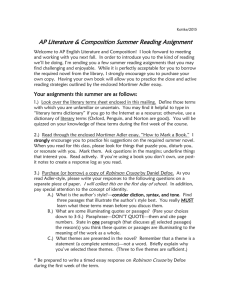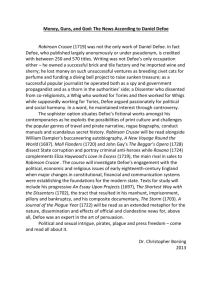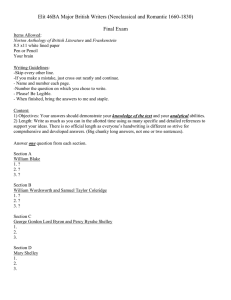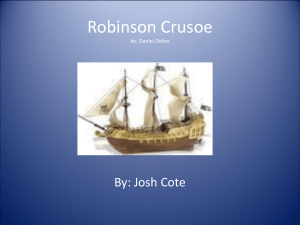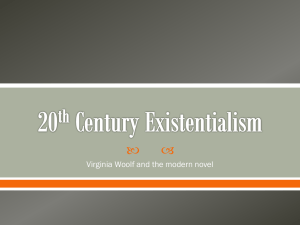Dr. Margaret E. Mitchell ENGL 2120 H: British Literature, Honors
advertisement
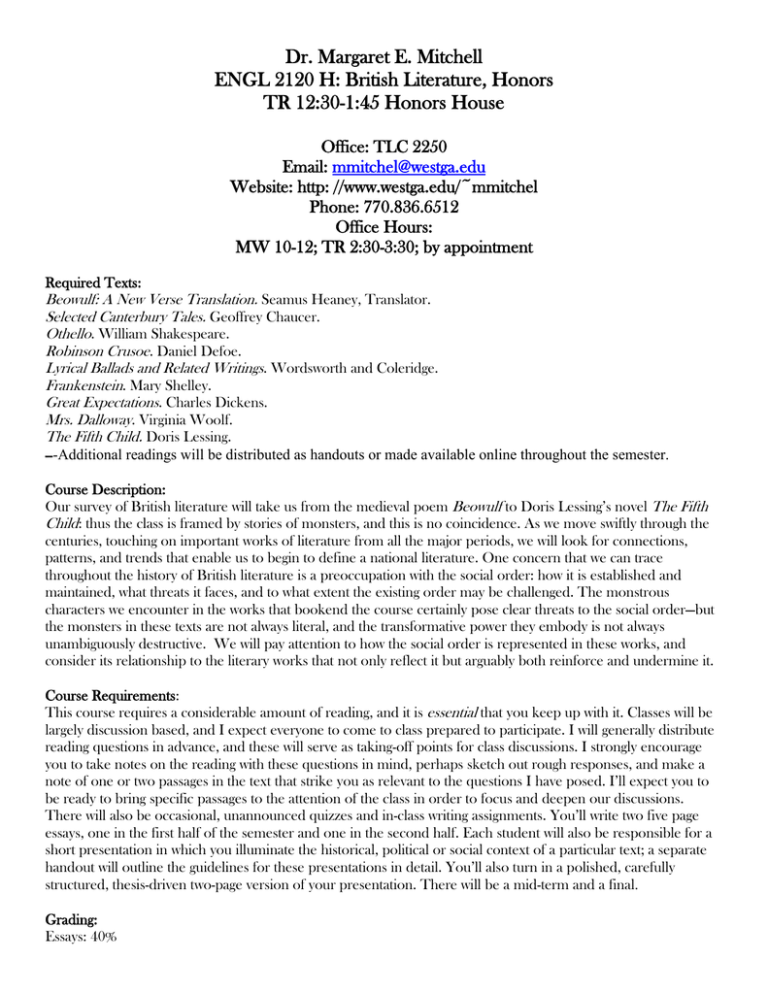
Dr. Margaret E. Mitchell ENGL 2120 H: British Literature, Honors TR 12:30-1:45 Honors House Office: TLC 2250 Email: mmitchel@westga.edu Website: http: //www.westga.edu/~mmitchel Phone: 770.836.6512 Office Hours: MW 10-12; TR 2:30-3:30; by appointment Required Texts: Beowulf: A New Verse Translation. Seamus Heaney, Translator. Selected Canterbury Tales. Geoffrey Chaucer. Othello. William Shakespeare. Robinson Crusoe. Daniel Defoe. Lyrical Ballads and Related Writings. Wordsworth and Coleridge. Frankenstein. Mary Shelley. Great Expectations. Charles Dickens. Mrs. Dalloway. Virginia Woolf. The Fifth Child. Doris Lessing. ---Additional readings will be distributed as handouts or made available online throughout the semester. Course Description: Our survey of British literature will take us from the medieval poem Beowulf to Doris Lessing’s novel The Fifth Child: thus the class is framed by stories of monsters, and this is no coincidence. As we move swiftly through the centuries, touching on important works of literature from all the major periods, we will look for connections, patterns, and trends that enable us to begin to define a national literature. One concern that we can trace throughout the history of British literature is a preoccupation with the social order: how it is established and maintained, what threats it faces, and to what extent the existing order may be challenged. The monstrous characters we encounter in the works that bookend the course certainly pose clear threats to the social order—but the monsters in these texts are not always literal, and the transformative power they embody is not always unambiguously destructive. We will pay attention to how the social order is represented in these works, and consider its relationship to the literary works that not only reflect it but arguably both reinforce and undermine it. Course Requirements: This course requires a considerable amount of reading, and it is essential that you keep up with it. Classes will be largely discussion based, and I expect everyone to come to class prepared to participate. I will generally distribute reading questions in advance, and these will serve as taking-off points for class discussions. I strongly encourage you to take notes on the reading with these questions in mind, perhaps sketch out rough responses, and make a note of one or two passages in the text that strike you as relevant to the questions I have posed. I’ll expect you to be ready to bring specific passages to the attention of the class in order to focus and deepen our discussions. There will also be occasional, unannounced quizzes and in-class writing assignments. You’ll write two five page essays, one in the first half of the semester and one in the second half. Each student will also be responsible for a short presentation in which you illuminate the historical, political or social context of a particular text; a separate handout will outline the guidelines for these presentations in detail. You’ll also turn in a polished, carefully structured, thesis-driven two-page version of your presentation. There will be a mid-term and a final. Grading: Essays: 40% Presentations (including written versions): 10% Quizzes, in-class writings, participation: 20% Exams: 30% Policies: Your active presence is essential to the success of the class. Quizzes and in-class writings cannot be made up. Response papers are due the class after you receive the questions, and you may not submit them late. Long papers will drop a third of a letter grade for each day they are late (from a B to a B-, for instance)—including weekends. Papers will be accepted only in class; please don’t email them to me or leave them in my mailbox. In other words, your grade is likely to suffer whenever you miss a class. If you miss 7 classes, you will not pass. Please come to class on time. If you are late three times it will count as an absence; lateness may also affect your ability to complete quizzes or in-class writings within the amount of time allowed. Please turn off cell phones and other potential sources of electronic disturbance before you enter class. If you have special needs of which I should be aware, please meet with me as soon as possible to discuss satisfactory arrangements. Academic Honesty: Any form of plagiarism will result in a failing grade for the assignment and may lead to a failing grade for the course; there may also be consequences at the university level. Whether the source is a book, a website, a friend, a classmate, or a parent, passing off someone else’s ideas or language as your own constitutes plagiarism. All outside sources must be properly acknowledged and documented. I will be glad to clarify any concerns you have about plagiarism. Schedule:* T 8/24 Introduction. Th 8/26 Beowulf T 8/31 Beowulf Th 9/2 Chaucer, The Canterbury Tales (Prologue) T 9/7 Chaucer, The Canterbury Tales (“The Millers Tale” and “The Tale of the Wife of Bath” Th 9/9 Shakespeare, Othello T 9/14 Shakespeare, Othello Th 9/16 17th-Century poetry T 9/21 Daniel Defoe, Robinson Crusoe Th 9/23 Defoe, Robinson Crusoe T 9/28 Defoe, Robinson Crusoe Th 9/30 Defoe, Robinson Crusoe; Essay #1 assigned T 10/5 Jonathan Swift, “A Modest Proposal” Th 10/7 Wordsworth and Coleridge, Lyrical Ballads T 10/12 Midterm Th 10/14 Wordsworth and Coleridge, Lyrical Ballads; Essay #1 due T 10/19 Mary Shelley, Frankenstein Th 10/21 Shelley, Frankenstein T 10/26 Shelley, Frankenstein Th 10/28 Charles Dickens, Great Expectations T 11/2 Dickens, Great Expectations Th 11/4 Dickens, Great Expectations T 11/9 Dickens, Great Expectations Th 11/11 Poetry: Browning, Hardy T 11/16 Virginia Woolf, Mrs. Dalloway Th 11/18 Woolf, Mrs. Dalloway; Essay #2 assigned T 11/23 Woolf, Mrs. Dalloway/ Heaney Th 11/25 Thanksgiving T 11/30 Doris Lessing, The Fifth Child Th 12/2 Lessing, The Fifth Child T 12/7 Review; Essay #2 due Final Exam I may make adjustments to the schedule as the semester progresses; please make a note of any changes I announce. You will also have access to a regularly updated version of the syllabus on my website. Course Goals Students will develop the ability to recognize and identify significant achievements in British literature. Students will understand the relevant social, historical, and aesthetic contexts of these literary works. Students will appreciate the implications of theoretical and critical approaches to such literature. Students will develop enhanced cultural awareness and analytical skills. Students will demonstrate their command of academic English and of the tenets of sound composition by means of thesisdriven analytical prose. Program Goals Oral and written communication will be characterized by clarity, critical analysis, logic, coherence, persuasion, precision, and rhetorical awareness (Core Curriculum learning outcomes I) Cultural and Social Perspectives: Cultural and social perspective will be characterized by cultural awareness and an understanding of the complexity and dynamic nature of social/political/economic systems; human and institutional behavior, values, and belief systems; historical and spatial relationship; and, flexibility, open-mindedness, and tolerance. (Core Curriculum learning outcomes III) Aesthetic Perspective: Aesthetic perspective will be characterized by critical appreciation of and ability to make informed aesthetic judgments about the arts of various cultures as media for human expression (Core Curriculum learning outcomes V) This course fulfills the Area C.2 requirement in the core for all students. Area C (Humanities/Arts) Learning Outcomes: 1. To develop the ability to recognize and identify achievements in literary, fine and performing arts; 2. To have an appreciation of the nature and achievements of the arts and humanities; and 3. To develop the ability to apply, understand, and appreciate the application of aesthetics criteria to “real world circumstances. This course fulfills an Area F requirement for English majors (all tracks) in the core. This course fulfills one of the core-level language arts requirements for Middle Grades Education majors. This course contributes to the program goal of equipping students with a foundation in literary history and the issues surrounding literary study in contemporary culture. This course broadens students' desire and ability to take pleasure in their encounter with literature.
